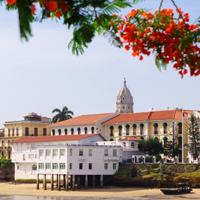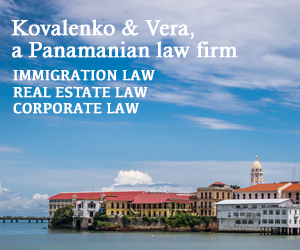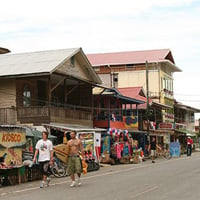Moving to Isla Taboga, Panama
Last updated on May 02, 2025
Summary: Moving to Isla Taboga, Panama: Expats, retirees and digital nomads talk about everything you need to know before moving to Isla Taboga.
What do I need to know before moving to Isla Taboga?
When we asked people what advice they would give someone preparing to move to Isla Taboga, they said:
"Isla Taboga, also known as the "Island of Flowers", is a volcanic island in the Gulf of Panama. It's a popular destination for expats due to its tropical climate, beautiful beaches, and rich history. Before moving to Isla Taboga, it's important to know that the primary language spoken is Spanish. While some locals may speak English, learning Spanish will make daily life and integration into the community much easier. The cost of living on Isla Taboga is relatively low compared to many Western countries. However, it's important to budget for expenses such as rent, groceries, utilities, and healthcare. Healthcare in Panama is generally of a high standard. However, on Isla Taboga, medical facilities are limited. For serious medical conditions, you would need to travel to Panama City. Therefore, it's recommended to have comprehensive health insurance that covers medical evacuation. The island has a slower pace of life, which can be a big adjustment if you're used to living in a bustling city. The local culture values relaxation and spending time with family and friends. Public transportation on Isla Taboga is limited. Most people get around on foot, by bicycle, or by boat. If you plan to travel to the mainland frequently, it's worth considering the cost and logistics of these trips. Isla Taboga has a tropical climate, with high temperatures and humidity year-round. It's important to be prepared for this, particularly if you're not used to such conditions. The island is generally safe, but like anywhere, it's important to take precautions. Be aware of your surroundings, secure your belongings, and avoid isolated areas at night. Finally, it's important to understand the visa and residency requirements for living in Panama. These can be complex, so it's worth seeking advice from a legal professional or expat community," remarked one expat who made the move to Isla Taboga.
How do I find a place to live in Isla Taboga?
We asked expats how they chose their neighborhood and found a place to live. They answered:
"Finding a place to live in Isla Taboga, involves several steps. First, you need to determine your budget and the type of accommodation you're looking for. This could range from a small apartment to a large house, depending on your needs and financial capabilities. Next, you should research the different neighborhoods on the island to find one that suits your lifestyle and preferences. Some areas might be closer to the beach, while others might be more residential or closer to amenities like shops and restaurants. Once you have a clear idea of what you're looking for, you can start your search. There are several online real estate platforms that list properties for rent or sale in Isla Taboga, such as Encuentra24, Compreoalquile, and Panama Realtor. These websites allow you to filter your search based on location, price, property type, and other factors. In addition to online searches, you might also want to consider hiring a local real estate agent. They can provide valuable insight into the local market, help you negotiate prices, and guide you through the legal process of renting or buying property in Panama. Visiting the island and viewing properties in person is also highly recommended. This allows you to get a feel for the area, inspect the condition of the property, and meet potential landlords or sellers. Finally, once you've found a property you're interested in, you'll need to negotiate the terms of the lease or sale, review the contract carefully, and then sign the agreement. If you're buying a property, you'll also need to arrange for the payment and transfer of ownership. Remember, moving to a new place can be a complex process, so it's important to do your research and seek professional advice if needed," explained one expat living in Isla Taboga, Panama.

Kovalenko & Vera is a Panamanian law firm that specializes in immigration law, corporate law, real estate law, banking, contract negotiation, taxes and flag registry. With more than 20 years of professional practice, Kovalenko & Vera builds lasting relationships with our clients to ensure your interests are safeguarded.
Click connect to have our partner contact you via e-mail and/or phone.

Kovalenko & Vera is a Panamanian law firm that specializes in immigration law, corporate law, real estate law, banking, contract negotiation, taxes and flag registry. With more than 20 years of professional practice, Kovalenko & Vera builds lasting relationships with our clients to ensure your interests are safeguarded.
Click connect to have our partner contact you via e-mail and/or phone.
What is a typical expat home or apartment like in Isla Taboga?
"Expat homes or apartments in Isla Taboga, are typically located near the beach, offering stunning views of the ocean. They are often designed with a blend of traditional Panamanian and modern styles, featuring open floor plans to allow for natural light and air circulation. The homes usually have two to three bedrooms, a living room, a fully equipped kitchen, and one or two bathrooms. Some homes may also have a balcony or a patio, perfect for outdoor dining or relaxation. The apartments are usually part of a larger complex with shared amenities like a swimming pool, a gym, and a communal garden. Despite being on an island, these homes are equipped with modern conveniences such as air conditioning, internet, and cable TV. The interiors are often decorated with local artwork and crafts, adding a touch of Panamanian culture to the living space," said one expat who made the move to Isla Taboga.
What is the average cost of housing in Isla Taboga?
If you are thinking about moving to Isla Taboga, cost of living in probably a key consideration. Expats commented about the cost of housing:
"The average cost of housing in Isla Taboga can vary greatly depending on the type and location of the property. For a standard home or condo, prices can range from moderately affordable to quite expensive. Luxury properties or those with ocean views can be priced significantly higher. It's recommended to research current real estate listings or consult with a local real estate agent for the most accurate and up-to-date information," remarked one expat who made the move to Isla Taboga.
Should I buy or rent a home in Isla Taboga?
If you have not spent a lot of time in Isla Taboga, you should rent before even thinking about buying. We asked expats there about the buy vs. rent decision:
"The decision to buy or rent a home in Isla Taboga, largely depends on your personal circumstances, financial situation, and long-term plans. If you plan to stay in Isla Taboga for a long period, buying a home could be a good investment. Owning a property allows you to build equity over time and could potentially provide a return on investment if property values increase. On the other hand, renting might be a better option if you're not planning to stay long-term or if you prefer not to have the responsibilities of home ownership. Renting can offer more flexibility, as it's easier to move if your circumstances change. It also means you won't have to worry about maintenance costs or property taxes, which are typically covered by the landlord. It's also worth considering the local real estate market. If property prices are high and predicted to fall, it might be better to rent for a while and buy later. Conversely, if prices are low and expected to rise, it could be a good time to buy. Finally, consider your financial situation. Buying a home requires a significant upfront investment, including a down payment and closing costs. If you don't have the funds available for these expenses, or if you'd prefer to keep your savings for other purposes, renting might be a better choice. In conclusion, both buying and renting have their pros and cons, and the best choice depends on your individual circumstances and goals. It's recommended to seek advice from a financial advisor or real estate professional before making a decision," replied a member in Isla Taboga.
What should I pack when moving to Isla Taboga?
We asked people living in Isla Taboga to list three things they wish they had brought and three they wish they had left behind. They responded:
"When moving to Isla Taboga, you should pack lightweight and breathable clothing due to the tropical climate. Include items such as shorts, t-shirts, and sundresses. Don't forget to pack a good quality sunscreen, a hat, and sunglasses to protect yourself from the sun. Swimwear is a must as the island is known for its beautiful beaches. Also, pack a light jacket or sweater for cooler evenings or unexpected rain showers. Waterproof shoes or sandals would be useful for beach activities and walking around the island. Remember to pack your essential toiletries, but keep in mind that you can also buy them on the island. If you take prescription medication, bring enough to last your stay, as specific medications might not be available. Pack a universal power adapter for your electronic devices as Panama uses type A and B plugs. Also, consider packing a Spanish-English dictionary or phrasebook if you're not fluent in Spanish. Don't forget to bring your passport, driver's license, and other necessary identification. Also, bring copies of important documents like your birth certificate, medical records, and insurance policies. Lastly, pack some entertainment for your downtime, such as books, portable games, or a laptop. If you plan on cooking, you might want to bring some of your favorite spices or condiments that may not be available on the island," said one expat in Isla Taboga.
 Kovalenko & Vera Attorneys at Law in Panama
Kovalenko & Vera Attorneys at Law in PanamaConnect
Kovalenko & Vera is a Panamanian law firm that specializes in immigration law, corporate law, real estate law, banking, contract negotiation, taxes and flag registry. With more than 20 years of professional practice, Kovalenko & Vera builds lasting relationships with our clients to ensure your interests are safeguarded.
Click connect to have our partner contact you via e-mail and/or phone.
 Kovalenko & Vera Attorneys at Law in Panama
Kovalenko & Vera Attorneys at Law in PanamaKovalenko & Vera is a Panamanian law firm that specializes in immigration law, corporate law, real estate law, banking, contract negotiation, taxes and flag registry. With more than 20 years of professional practice, Kovalenko & Vera builds lasting relationships with our clients to ensure your interests are safeguarded.
Connect
Click connect to have our partner contact you via e-mail and/or phone.
What cultural faux pas should I try to avoid making in Isla Taboga?
We asked people in Isla Taboga if they could share any humorous cultural blunders they commited. For new expats, keep in mind that these incidents are an inevitable part of expat life. Learning to laugh about them is the key!:
"When visiting Isla Taboga in Panama, it's important to respect the local customs and traditions. Avoid wearing revealing clothing, especially in religious or traditional settings, as it is considered disrespectful. Panamanians value punctuality, so try not to be late for appointments or social gatherings. Avoid discussing sensitive topics such as politics, religion, or personal finances, as these can be seen as intrusive or disrespectful. It's also considered rude to interrupt someone while they're speaking, so wait for your turn to talk. When dining, remember that it's customary to finish everything on your plate as a sign of appreciation for the meal. Also, tipping is expected in restaurants, so be sure to leave a tip of around 10-15% of your bill. Avoid pointing with your fingers, as this is considered rude. Instead, use your whole hand to gesture. Lastly, remember to greet people with a handshake and maintain eye contact, as this is seen as a sign of respect and sincerity," said one expat in Isla Taboga.
About the Author
 Joshua Wood, LPC is one of the Founders of Digital Nomad Exchange and serves as Co-President of Expat Exchange. Prior to Expat Exchange and Digital Nomad Exchange, Joshua worked for NBC Cable (MSNBC and CNBC
Primetime). Joshua has a BA from Syracuse and a Master's in Clinical and Counseling Psychology from Fairleigh Dickinson University. Mr. Wood is also a licensed counselor and psychotherapist.
Joshua Wood, LPC is one of the Founders of Digital Nomad Exchange and serves as Co-President of Expat Exchange. Prior to Expat Exchange and Digital Nomad Exchange, Joshua worked for NBC Cable (MSNBC and CNBC
Primetime). Joshua has a BA from Syracuse and a Master's in Clinical and Counseling Psychology from Fairleigh Dickinson University. Mr. Wood is also a licensed counselor and psychotherapist.
Some of Joshua's articles include Pros and Cons of Living in Portugal, 10 Best Places to Live in Ireland and Pros and Cons of Living in Uruguay. Connect with Joshua on LinkedIn.
![]() Panama Forum
Panama Forum
Talk with other digital nomads and expats in Panama on our Panama forum - meet people, get advice and help others.
![]() Contribute
Contribute
Help others in Panama by answering questions about the challenges and adventures of living in Panama.
Digital Nomads in Panama offer advice about healthcare, hospital visits, emergency rooms visits, finding a doctor and buying health insurance in Panama.




